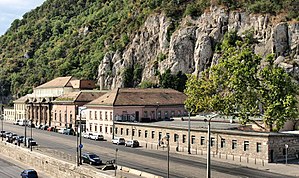
Rudas Bath or Rudas fürdő (Hungarian pronunciation: [ˈrudɒʃ ˈfyrdøː]) is a thermal bath in Budapest, Hungary which is claimed to have medicinal properties. It was founded in 1571/1572 during the time of Ottoman rule. To date, it retains many of the key elements of a Hammam, exemplified by its Ottoman dome and octagonal pool. It is located at Döbrentei tér 9 on the Buda side of Erzsébet Bridge. The bath has six therapy pools and one swimming pool where the temperature is in between 10 and 42 °C (50 and 108 °F). The components of slightly radioactive thermal water includes sulfate, calcium, magnesium, bicarbonate and a significant amount of fluoride ion. A sight-seeing brochure claims the water can help to treat degenerative joint illnesses, chronic and sub-acute joint inflammations, vertebral disk problems, neuralgia and lack of calcium in the bone system.
The baths were commissioned by Sokollu Mustafa Pasha who was the governor (beylerbey) of Buda between 1566 and 1578. This is inscribed in Hungarian in the baths, on a stone standing atop the Juve spring, which is believed by locals to have a rejuvenating effect on people. As Sokollu Mustafa Pasha was the nephew of Grand Vizier Sokollu Mehmed Pasha, Rudas baths echoes the design and dimensions of similar monumental Ottoman constructions in Istanbul.
The baths were used as a location for the opening scene of the 1988 action movie Red Heat, starring Arnold Schwarzenegger and James Belushi. An orgy scene was filmed in 1997 in the octagonal pool for the adult movie Concupiscence.
It re-opened at the beginning of 2006, after a comprehensive renovation of its interior.
The baths are open to women only on Tuesdays, to men the rest of the week, and both men and women on the weekend. The attached swimming pool is always open to both men and women.
Gallery

-
Turkish times
-
 Hungária drinking fountain
Hungária drinking fountain
-
 After world war 2
After world war 2
-
 1960's
1960's
-

-

-
 Swimming pool
Swimming pool
-
 Swimming pool (29 °C)
Swimming pool (29 °C)
-
 32 °C
32 °C
-
 36 °C
36 °C
-
 42 °C
42 °C
-
 Sauna world
Sauna world
-
 Salt room
Salt room
-
 Aroma sauna
Aroma sauna
-
 Dry sauna
Dry sauna
-
 Finnish sauna
Finnish sauna
-
 Drinking well
Drinking well
Notes
- ^ Papp, Adrienn (2018). The Turkish Baths of Hungary: Archaeological Remains of the Ottoman Era. Budapest: Archeolingua. ISBN 978-615-5766-05-3.
- "Baths in Budapest - a guide for students", Budapest Corner, archived from the original on 2016-03-03, retrieved 2010-12-14
- Papp, Adrienn. (2011). Building and builder: Constructions under Sokollu Mustafa Pasha's reign in medieval Buda. In Biedronska-Slota, B.; Ginter-Frolow, M. & Malinowski, J. (ed). The Art of the Islamic World and the Artistic Relationships Between Poland and Islamic Countries. Manggha Museum of Japanese Art and Technology & Polish Institute of World Art Studies. pp. 75-83.
- Opening Times, Rudas Thermal Bath and Swimming Pool
External links
47°29′20.73″N 19°2′52.32″E / 47.4890917°N 19.0478667°E / 47.4890917; 19.0478667
- Budapest Spas and Hot Springs entry on Rudas Baths
- Aerial photographs
- (in German) Thermen in Budapest
| Thermal Baths of Hungary | |
|---|---|
| Budapest | |
| Others | |
| Historical stages |
(See also: Ottoman architectural decoration) |  | |||
|---|---|---|---|---|---|
| Other regional styles | |||||
| Mosques |
| ||||
| Madrasas | |||||
| Türbes (tombs) | |||||
| Caravanserais | |||||
| Hospitals | |||||
| Bridges | |||||
| Fortifications | |||||
| Palaces | |||||
| Clock towers | |||||
| Fountains | |||||
| Hammams | |||||
| other monuments | |||||
This article about a Hungarian building or structure is a stub. You can help Misplaced Pages by expanding it. |